Despite an oft quoted figure of 3 billions dollars since 2005, it seems YouTube actually has has no idea what it’s paying artists, although the evidence seem to be fairly clear that it’s not enough, says Ted Kalo.
_______________________________
Guest Post by Ted Kalo on Medium
For one of the richest, most valuable companies in the world, a few extra or less dollars here or there probably doesn’t mean as much as it would to someone else: a working musician, for example.
But about a few billion dollars more or less?
Because that’s what Google recently admitted to the New York Times — that it has been misstating its supposed billions of dollars in YouTube payment to music creators for years.
Some context: LOTS of music creators are not happy with Google/YouTube.The company games a very old law (dating back to the glory days of AOL) to make tons of cash selling ads around unlicensed copies of music, and then pays pennies (or really fractions thereof) to the people who actually make music.
T Bone Burnett and Jonathan Taplin have eloquently taken to editorial pages to denounce this shortsighted and immoral business model, and Mr. Burnett recently spoke out about it in the halls of Congress.
When music creators complain about small payments to individual musicians, Google/YouTube does what really big companies usually do: cite a big, aggregate number.
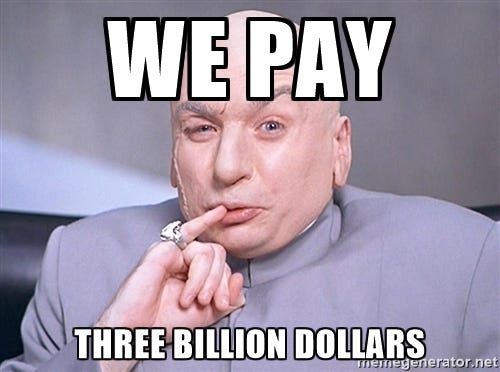
That’s right, Google said over and over to media outlets: Google, all of it, paid music creators three billion dollars since 2005.
To the Financial Times, Wall Street Journal, the Verge, Google said its entire company, including YouTube has paid music creators three billion dollars since 2005.
They even said it in an official government filing (to the U.S. Copyright Office) earlier this year. You’d think they would want to be truthful/accurate in such a filing. There are laws about that kind of thing.
It should be noted that there is absolutely no way of knowing if that $3 billion figure is or was accurate, or vastly inflated. But they’ve said it and said it and said it.
That’s why the following paragraph in a recent New York Times article is so strange:
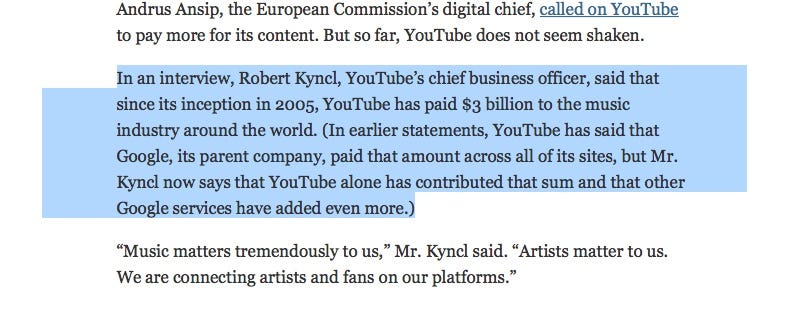
Now, it’s $3 billion just from YouTube, not from all of Google?
And the precise number from all of Google? The company says it’s exactly, precisely “even more.” Doesn’t exactly inspire confidence.
You’d think a big company, trying to come up with a really big number to justify itself, would use the biggest possible number it could fairly cite. If Google pays music creators “even more” than $3 billion, why haven’t they said so?
One answer, suggested by the Trichordist blog, is that Google/YouTube is so inconsistent and haphazard in how it pays music creators, it just doesn’t know the truth. Maybe the company just doesn’t track what music has been played very accurately and so royalty payments to musicians are inaccurate and incomplete.
Another of course, is that “even more” actually means “really not very much at all” and Google/YouTube is just spinning here — trying to artificially inflate what it pays under the onslaught of criticism it’s receiving about its below market royalties and abuse of the DMCA safe harbors.
And there’s a third door open as well — maybe none of these figures are right. If a Google/YouTube executive can just casually rewrite a long history of claiming three billion dollars in total payments with an aside to the New York Times, what’s to stop them from doing so again?. Why on earth should we believe the new “$3 billion from YouTube” claim?
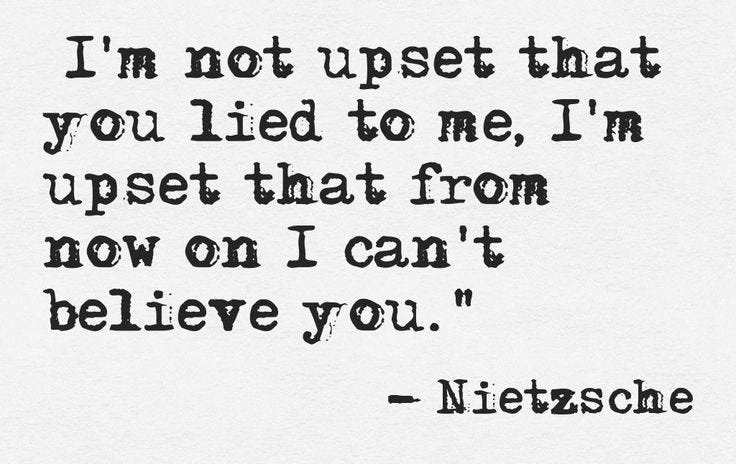
It’s just one of many problems that come from the fact that Google/YouTube are not real partners in the music ecosystem.
Their Chief Copyright Counsel, Fred Von Lohmann epitomized this “let them eat cake” attitude toward music creators this weekend when he tweeted a quote that YouTube is “a goldmine” of “found money.”
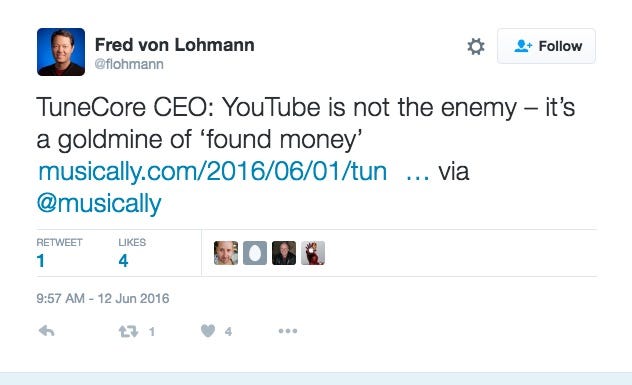
Actually, it is. Google/YouTube “found money” that rightfully belongs to music creators. It’s a “goldmine” of several billion dollars give or take, for Google/YouTube. And that’s the textbook definition of a value grab.
(Another indicator is their membership — with big corporate radio — in the anti-artist MIC Coalition.)
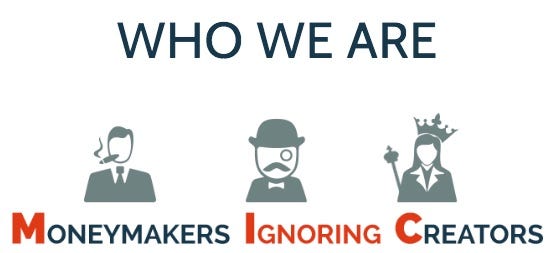
Now, hot off the presses comes word from Google/YouTube that:
“The voices of the artists are being heard, and we’re working through details with the labels and independent music organisations who directly manage the deals with us.”
As Melvin Gibbs, the President of the Content Creators’ Coalition, said:
“None of these companies that are supposedly in the music business are actually in the music business. They are in the data-aggregation business. They’re in the ad-selling business. The value of music means nothing to them.”
One wonders whether they truly hear artists or will engage in misdirection and declare the problem solved? It’s been tried before. Remember the Pandora petition scandal?
The deal might even be off by a billion dollars or three.
Google doesn’t seem to care.
They can’t be trusted.
Music creators will read the fine print.
That’s why we are taking a stand against #GoogleMath.
#UpdateDMCA
Ted Kalo, Executive Director of musicFIRST, coalition of the music community that supports paying music creators when their work is played on radio platforms.